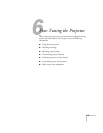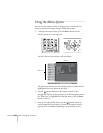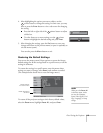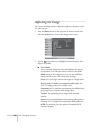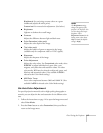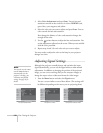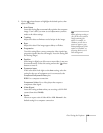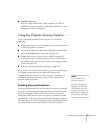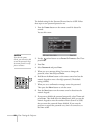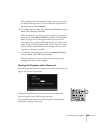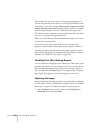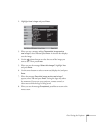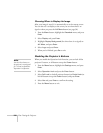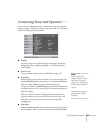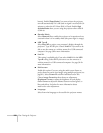
Fine-Tuning the Projector 121
■ EasyMP Audio Out
Lets you output sound from EasyMP scenarios (.wav files) or
MPEG files to external speakers with built-in amplifiers. Connect
the speakers as shown on page 46.
Using the Projector Security Features
To prevent unauthorized use of the projector, you can do the
following:
■ Assign a password; this can be disabled for a set period if you want
to loan the projector to someone.
■ Create an identifying user logo that is displayed at startup and/or
when the
A/V Mute button is pressed. See page 124.
■ Disable the projector’s buttons; this is useful, for example, if
you’re projecting in a classroom and you want to ensure that no
one touches the projector’s buttons while you’re using the remote
control. See page 126.
■ Lock the network configuration settings. See page 123.
If you create a user’s logo for the projector, you can set up the logo so
it is displayed as the startup screen and/or AV/Mute screen.
Unauthorized users cannot turn it off or change it. This feature is
intended to discourage theft and provides a way to identify the
projector should it be stolen.
Enabling Password Protection
To prevent unauthorized use, you can assign the projector a password.
If you do, a screen will appear requesting the password whenever the
projector is plugged in and turned on. If an incorrect password is
entered three times in succession, the projector’s operation is locked
and the power cord must be disconnected and reinserted to redisplay
the password screen. If an incorrect password is entered thirty times in
succession, the user must contact Epson to unlock the projector.
note
It’s a good idea to write
down your password.
If you leave the projector
plugged in, the Password
Protect Release screen will
not appear. You only need a
password if you unplug and
reconnect the power cable.



